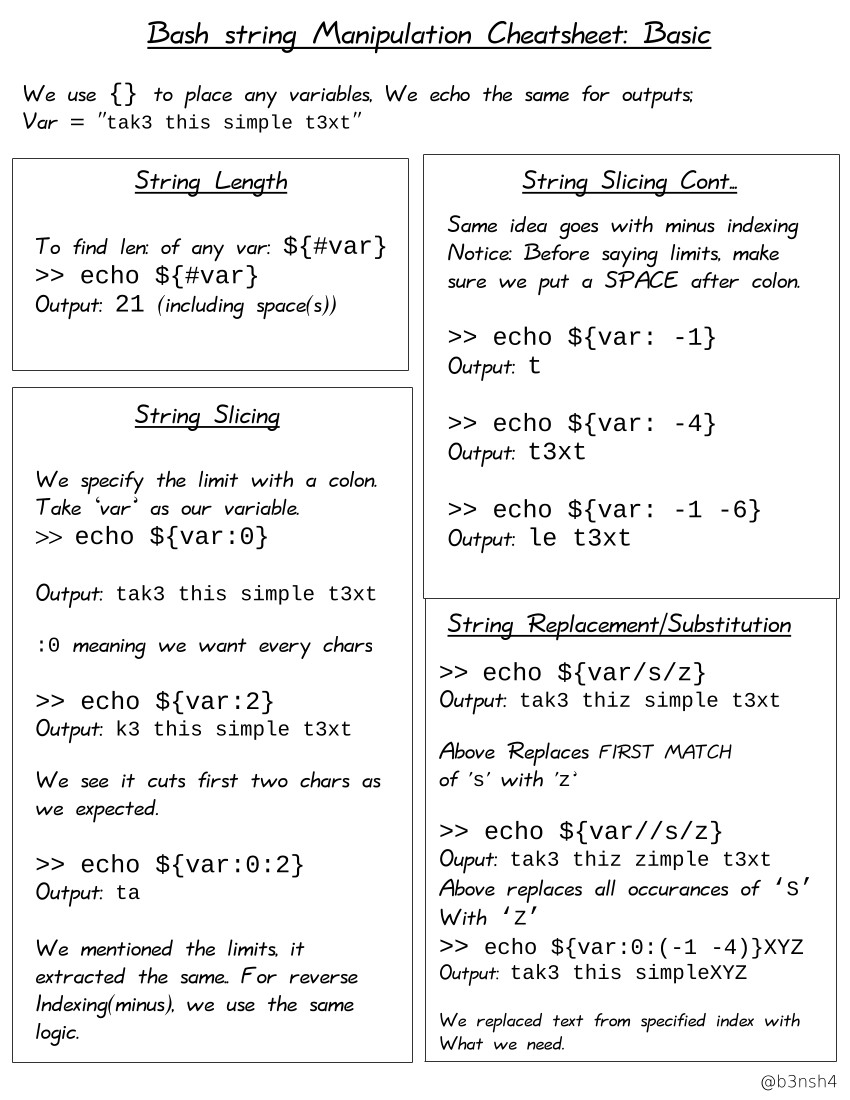String Manipulation 字串處理
字串長度
my_string="abhishek"
echo "length is ${#my_string}"Using expr
str="my string"
length=$(expr length "$str")
echo "Length of my string is $length"Using awk
echo "my string" | awk '{print length}'Using wc
str="my string"
length=$(echo -n "my string" | wc -m)
echo "Length of my string is $length"字串比對
Using wildcards
#!/bin/bash
STR='GNU/Linux is an operating system'
SUB='Linux'
if [[ "$STR" == *"$SUB"* ]]; then
echo "It's there."
fiUsing case
#!/bin/bash
STR='GNU/Linux is an operating system'
SUB='Linux'
case $STR in
*"$SUB"*)
echo -n "It's there."
;;
esacUsing Regex
#!/bin/bash
STR='GNU/Linux is an operating system'
SUB='Linux'
if [[ "$STR" =~ .*"$SUB".* ]]; then
echo "It's there."
fiUsing Grep
#!/bin/bash
STR='GNU/Linux is an operating system'
SUB='Linux'
if grep -q "$SUB" <<< "$STR"; then
echo "It's there"
fi字串合併
str1="hand"
str2="book"
str3=$str1$str2字元提取
foss="Fedora is a free operating system"
echo ${foss:0:6}_admin_ip="202.54.1.33|MUM_VPN_GATEWAY 23.1.2.3|DEL_VPN_GATEWAY 13.1.2.3|SG_VPN_GATEWAY"
for e in $_admin_ip
do
ufw allow from "${e%%|*}" to any port 22 proto tcp comment 'Open SSH port for ${e##*|}'
done字元取代
foss="Fedora is a free operating system"
echo ${foss/Fedora/Ubuntu}Summary: String Manipulation and Expanding Variables
${parameter:-defaultValue} |
Get default shell variables value |
${parameter:=defaultValue} |
Set default shell variables value |
${parameter:?"Error Message"} |
Display an error message if parameter is not set |
${#var} |
Find the length of the string |
${var%pattern} |
Remove from shortest rear (end) pattern |
${var%%pattern} |
Remove from longest rear (end) pattern |
${var:num1:num2} |
Substring |
${var#pattern} |
Remove from shortest front pattern |
${var##pattern} |
Remove from longest front pattern |
${var/pattern/string} |
Find and replace (only replace first occurrence) |
|
echo "${PATH//:/$'\n'}" |
Find and replace all occurrences |
${!prefix*} |
Expands to the names of variables whose names begin with prefix. |
|
|
Convert first character to lowercase. |
|
|
Convert all characters to lowercase. |
|
|
Convert first character to uppercase. |
|
|
Convert all character to uppercase. |
Cheatsheet: String Manipulation
String To Integer
# $((string))
sum=$((3+6))
echo $sum
a=11
b=3
c=$(($a+$b))
echo $cAlternate method: expr
Note that it is not a “native” Bash procedure, as you need to have
coreutilsinstalled (by default on Ubuntu) as a separate package.
a=5; b=3; c=2; d=1
expr $a + $b \* $c - $d去除變數的末端字元 .XXX
# Operator "#" means "delete from the left, to the first case of what follows."
x="This is my test string."
echo ${x#* }
is my test string.
# Operator "##" means "delete from the left, to the last case of what follows."
x="This is my test string."
echo ${x##* }
string.
# Operator "%" means "delete from the right, to the first case of what follows."
x="This is my test string."
echo ${x% *}
This is my test
# Operator "%%" means "delete from the right, to the last case of what follows."
x="This is my test string."
$ echo ${x%% *}
This


No Comments